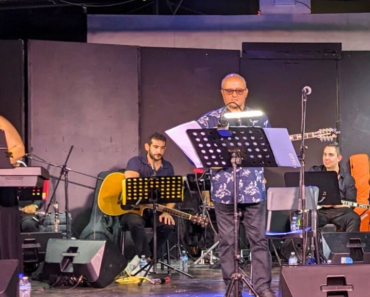
Greek is present in the languages of the Western world—and beyond. This Spanish oldie by an Argentinian musical group called Apurimac, featuring Greek singer Elli Paspala, is living proof that there indeed are thousands of Greek words in every language.
Apurimac created this song, entitled “My Last Tango in Athens” in which almost the lyrics are in the Greek language, back in 2012.
Only the refrain of the song, which could be translated as following, is in Spanish: “This is my last tango in Athens. A sorrowful tango running through my veins. This is my last tango in Athens.”
The Greek language now has its own World Day, which is celebrated annually every February 9, the day which also honors the memory of Greece’s national poet Dionysios Solomos, who wrote Greece’s national anthem ”Hymn to Liberty.”
17,000 Greek Words in the Spanish Language
Argentinian composer Daniel Armando recounted during an interview with the radio show “Ellinofrenia” that he had received the inspiration to write the song during a trip to Cuba after he entered a book store and found a book entitled “17,000 Greek words in the Spanish language.”
The group Apurimac, which in the Quechua indigenous language of South America means “God of Speech,” was formed in 1983, and a number of their songs use Greek lyrics.
They collaborated in 2000 with Vassilis Papakonstantinou, George Dalaras and others to produce a CD for the organization Doctors Without Borders titled “No Borders.”
Ancient Greek Colonies in Spain
The Greeks started colonizing around the 8th century BC. Several of the city-states were strong maritime powers, dominated trade in the Eastern Mediterranean, and had substantial power further West to North Africa and modern-day Italy, France, and Spain.
By 500 BC, historians estimate there were about five hundred Greek colonies across the ancient world with sixty thousand Greeks residing there, accounting for forty percent of all Greeks in the Hellenic World.
However, Small fragments from the Middle to Early Late Bronze Age indicate the presence of Mycenaean Greek materials on the Iberian Peninsula, confirming the existence of Mediterranean trade prior to the arrival of the Phoenicians.

Greek Language Day
International Greek Language Day is celebrated annually every February 9, the day which also honors the memory of the Greek national poet Dionysios Solomos, who wrote Greece’s national anthem ”Hymn to Liberty.”
This celebration seeks to highlight the Greek language’s fundamental role and defining contribution in the development and establishment of European and world literacy and culture.
Greek remains a language which greatly enriches international scientific discourse. More than any other tongue, it is the language which developed, shaped and expressed most of the scientific theories, philosophical thoughts, and literature in most of the modern-day languages of the Western world.







